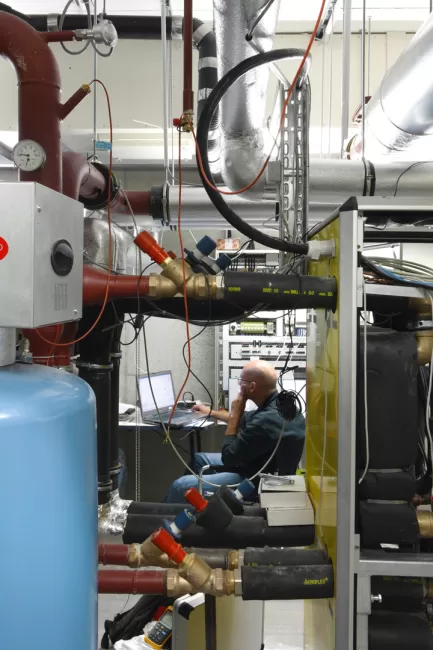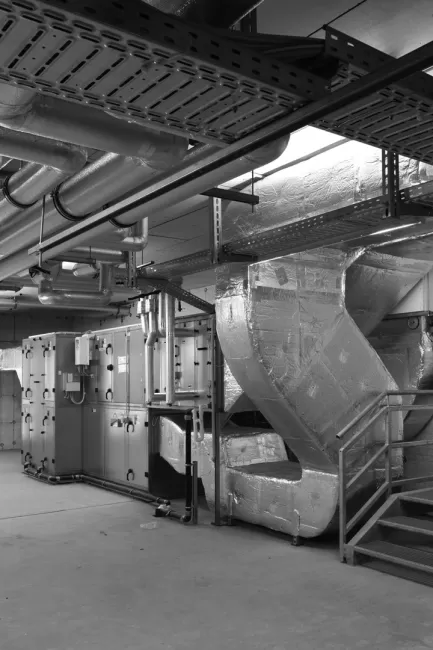Technology

Heinrich Böll Foundation, Mechanical Room, 2008
In a time in which the overwhelming opinion is that technology can no longer keep pace with the speed of catastrophic, global climate phenomena, unstoppable growth, and resource consumption, we are reaching a moment when the construction of technology should be allocated far more relevance than the technology of construction. While abandoning a direct leadership, technology may solve and provide for our general needs and demands, contingent on whether or not one can widen the conception of technology and assign “ethical” criteria to the idea, which would enable its projection onto the individual and society. This must be a projection which makes it possible for people to consciously comprehend actions and decisions.
Today, technological development represents the transportation of technology further and further away from people; it becomes an omnipresent atmosphere, conceptualized as automated, and presents an ever-greater risk of isolation.
The current status of technology formulates unsurprising premises in which one tries to realize a building as closely as possible to a computed model.

Interaction with the user is thus relegated to “psychological” insufficiency, and is compensated with precautionary increased efficiency. It is noteworthy that man is considered problematic not only in relation to the environment, but also as a problem within in the framework of the technology developed to serve him. The building services engineering practiced today is a child of the ‘70s. Consciousness of the oil crisis and the need to save energy is deeply ingrained. The heritage of fossil fuels still remains in the depths of our consciousness. All of our current labels and energy standards are based upon the idea of saving power and constraining possible losses, and they have reached a physical limit.
It is not possible to build more compactly and more densely. In the future, the issue will not be about creating an even more efficiently insulated envelope, but rather the production, flexibility, and cultivation of available energy sources.
Standards and labels have become popular signs of an environmentally conscious culture. They are connected with the ever-increasing growth of technocracy; ultimately they are connected with big business, and if one can believe our politicians, large export technology. Thus, the sustainability expert has become the alter ego of the architect; with long pages of checklists, he dons the uniform of the commissar for political and social correctness.

Innovation today faces the dilemma of needing to reduce use of resources through techniques that are always more efficient yet simultaneously decisive and responsible. Efficiency and effectiveness always stand in the way of a possible sufficiency, which is more than unpopular in a consumption-oriented society. Will an environmental paradigm shift depend on a new Puritanism or a new life view?
That is what an image of the 2000-watt society anticipates: a society in which every one of us travels only by bicycle, spends family vacations camping in the surrounding environment, considers travelling abroad completely unnecessary, and consumes at most a third of the energy currently used per person. This idea, which is circulated in mailbox fliers from the highest political levels, depicts only an empty concept of sustainability, apparently devoid of ideas, that has become unbelievably popular.
It shows the necessity for a change in production and use, potentially with financial incentives.
How earnestly our society moves towards such a vision is documented by both locally and globally tumultuous politics, which measure their worth by their efforts to achieve their self-formulated goals, and then repeatedly push them further away. Thus, all one can do, as Sloterdijk noted after the failure of the climate change summit in Copenhagen, is to think more diabolically than ever. “Trusting in a mere ethic of abstention would be naïve indeed.” 1
How does one construct technology if energy is available in the post-fossil fuel era?
– If the existing resources can be “consumed”? – If saving no longer provides any additional value, since it is always available? – If consumption is still, as before, fun? – If glass, walls, ceilings, or clothing provide energy that we can use? – If an urbanism that is simultaneously useful provides initial solutions for a post-fossil fuel society? – If a no longer imperative compactness attains a new porosity, with a surface of intense inner and exterior fabric? Will this be the recapture of the architectural idea?
Photographs: Jan Bitter